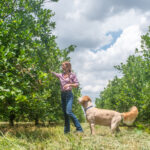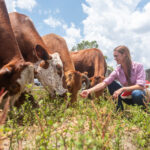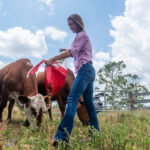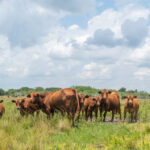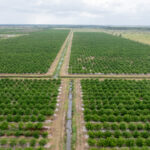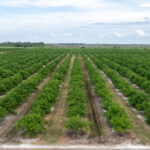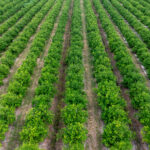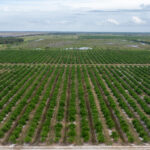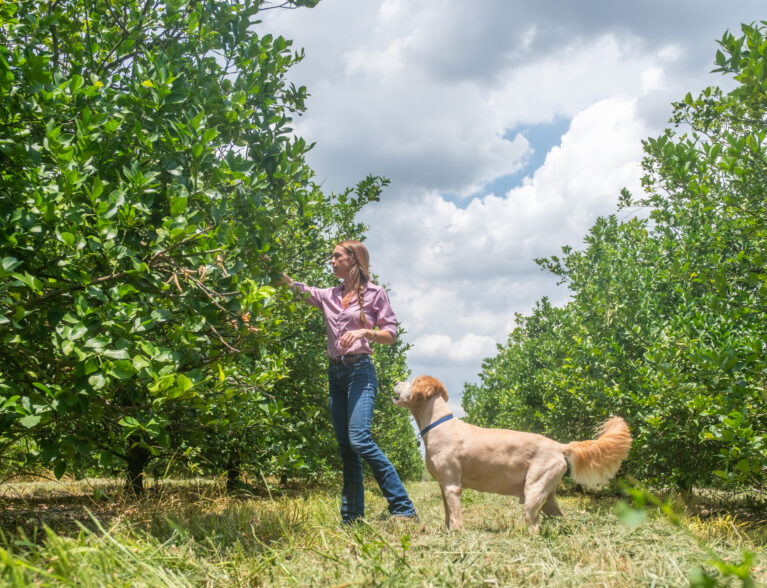
While Florida’s citrus industry is winding up its worst season in more than a century, passionate and innovative second- and third-generation growers in Indian River County continue to nurse hope their oranges and grapefruits – long regarded as the best in the world – have a future.
“We believe this is worth fighting for,” says second-generation grower and packer Tim Sallin, 47, co-CEO of IMG Citrus, the largest fruit company in county. “We hope to rebuild Indian River citrus on a new foundation and pass the business down to our children.
“It is tough, but we have the passion and grit to stay in it. Even with greening and all the challenges, there is a sliver of hope if we can heal the soil and put more thought into regenerative agricultural.”
“I love citrus. It is in my blood,” says Aubrey Greene, 34, a third-generation grower who co-manages her family’s sprawling citrus and cattle lands west of I-95 and runs Greene Sugars, a virtual farm stand she created to leverage social media to sell premium fresh fruit.
The peak year for oranges in Florida was the 2003-2004 season – just before two devastating hurricanes wrecked square miles of groves – when the state produced 242 million field boxes of containing more than 10 billion pieces of tasty fruit.
By the 2023-2024 season, orange production had plummeted to 17 million boxes, and the USDA predicts that the current season now winding down will yield a mere 11.6 million boxes, less than five percent of the yield 20 years ago.
Indian River County and the rest of the Indian River Citrus District, which stretches from Daytona to Palm Beach, have been hit hard by statewide the decline.
Grapefruit, Indian River County’s signature crop, reached a plateau in the 1970s and stayed strong for 30 years, until the 2004 superstorms. Statewide production, which peaked at around 60 million boxes, is down to 1.2 million boxes.
“There used to be a least 20 packing houses in Indian River County. Now there are three,” says Dan Richey, president and CEO of Riverfront Packing, one of the remaining three, located at U.S. 1 and 49th Street.
Thousands of acres of flowering groves once blanketed much of the northern barrier island and the mainland shore of the lagoon. Today, only scattered remnants remain east of I-95, according to Richey.
“Almost everybody in the county was connected to citrus directly or indirectly [in its heyday],” says Sallin. “Now you can count them on your fingers.”
Yet citrus survives here, thanks mostly to the stubborn efforts of pioneering Vero citrus families, along with some relative newcomers equally obsessed with the historic industry.
The rearguard has hope – “I have a gut feeling the industry will survive,” says Greene – and some reasons to hope.
Florida citrus has been buffeted by a wild barrage of harmful forces in the past 50 years, from hard freezes in the 1980s that killed thousands of trees, to canker disease in the 1990s and hurricanes in the 2000s, along with the pressure of cheap foreign competition, housing development eating up citrus land, and, most recently, destructive tornados!
But citrus greening is the main cause of the collapse, and progress is being made against that so far incurable disease.
Greening is spread by a tiny invasive insect called the Asian citrus psyllid that has a gut full of wicked bacteria it transfers to trees while feeding on their leaves. The infection does not immediately kill, but weakens the tree, and each re-infection makes it worse.
“It isn’t that a bug bites a tree, and it dies,” says Sallin. “It is a gradual process that makes the trees unproductive and eventually destroys them.”
“We are in an ongoing battle against the disease,” Richey adds. “Between growers, state and federal funding, we have spent a billion dollars on research to defeat it.”
Three main techniques are now being employed with some success. The white nets you see over small trees when driving on Route 60 west of I-95 keep the vector bugs off the trees for the first few years. Spraying the leaves of more mature trees with a clay solution helps, too, because the miniscule insects don’t like clay. Antibiotics are the third weapon.
Drilling a small hole in a tree‘s trunk that taps into its vascular system and hanging an IV drip filled with oxytetracycline, “seems to be working fairly well” to damp down the bacteria load and keep trees productive, according to Richey.
And more weapons are on the way. Richey says a gene-edited, disease resistant tree that would be non-GMO is in the works, and researchers have “discovered a way to augment citrus trees natural immune response to pathogens” so they recognize and destroy the greening bacteria, according to an article on the USDA website.
Besides progress against greening, Vero’s remaining citrus growers are surviving and even expanding by adopting new growing practices and market strategies, such as planting more trees per acre to make the land profitable and shifting sales to the United States instead of abroad to sidestep low-cost competitors who have crowded into the foreign markets in Asia and Europe where Indian River Fruit once brought glittering prices.
“Indian River has a perfect blend of soil and climate,” says Sallin. “Overseas customers paid three times as much for Florida fruit than for citrus from Mediterranean or South America.”
Growers have also created vertically integrated operations where they plant, tend, pick, pack, market and sell citrus directly to the public or retailers, cutting out any middlemen and keeping the slender profit margin from each activity in house.
Richey is in business with the Scott family, famed St. Lucie growers who have 3,500 acres of grapefruit trees whose fruit goes to the packing house on 49th Street, giving the company control over everything from planting to packing.
“Our operation is one that sees everything from the planting of the tree to the box delivered in Chicago,” says Matt Schorner, another third generation Indian River grower. “We also have a local roadside store and restaurant – Al’s Red Barn Grill – in a historic barn.”
“I oversee our packinghouse – which dates from the 1930s – managing incoming and outgoing fruit, and juice recipes made from 100-percent fresh oranges and grapefruit with no additives. I also fill in where needed, as this is a true family run business.”
Countryside Citrus is yet another multigenerational citrus business still operating in Vero that has integrated vertically and expanded. Run by Rusty Banack and his family, the business includes a farm store west of town and a shop on Ocean Dr. on the island that sells fresh juice and other citrus projects, along with tacos.
IMG bought a gargantuan 185,000-square-foot packing, cold storage and shipping facility on Route 60 west of I-95 along with 1,000 acres of farmland two years ago to centralize and integrate its operations.
“We no longer export, even though our old customers beg for fruit,” says Sallin, whose growing family company has 700 employees and 14,000 acres of farmland, including 7,000 acres in production. “We focus on southeast now, reducing food miles and getting the highest price by dealing directly with retailers.”
Diversification, which was championed by Aubrey Greene’s grandfather, Barney Greene, one of the legendary figures in Indian River citrus, is another key tactic keeping growers afloat.
Barney who bought his first 20 acres of citrus land in Vero in the 1950s and went on to a stellar career in citrus growing and business operations, buying vast tracts of land and leading the formation of drainage districts, grower associations and a successful bank, diversified into cattle early on and eventually had a herd of 3,000.
When conditions and cash flow were weak in citrus, the cattle held the family up, and vice versa.
Sallin’s family, who branched out to Florida in the 1970s from France where they were in the apple juice business, have a thriving ornamental plant business alongside their citrus operation.
Higher prices help, too.
“Citrus prices have gone up a lot, which has added to viability for remaining growers,” says Indian River County Property Appraiser Wesley Davis, whose family once had 300 acres of grapefruit trees.
A drastically reduced supply of prime Florida citrus has made the remaining fruit more valuable.
“It has become a niche fruit and people are willing to pay more,” says Sallin. “We would not be in business if it wasn’t for higher prices. Even with higher prices, it is very tough to get yields that cover production costs.”
But no factor is more important in the survival of Indian River citrus than the passionate determination of the families whose fortunes were made by the colorful fruit.
Aubrey Greene’s earliest memories are of her family’s groves off 122nd Ave.
“I am one of four sisters, and my dad would bring all of us out here sometimes to give my mom a break and we absolutely loved it. This was our playground,” says Greene.
As a teenager, she drove her famous grandfather around the groves while he mentored her in the art and science of caring for citrus trees.
“My grandfather was a genius,” she says of the World War II combat veteran who had the rare honor of being inducted into both the Florida Citrus Hall of Fame and the Florida Agricultural Hall of Fame. “He taught me to truly see the trees. I would be looking but not seeing. Then he would point something out and, boom, it would click into place.”
Her main job at the groves today is an activity called scouting, where she systematically patrols the groves using her ingrained citrus intelligence and observation skills and a magnifying device to “see” the trees and perceive what they need.
She works alongside her father, Ellis Aubrey Greene, another major citrus figure, and 7 farmhands, including the foreman, Jimmy, who has been with the family for 30 years.
“In springtime, I get up around 5:30 and have coffee and I am out here by 6:30, “Aubrey told Vero Beach 32963. “I ride the perimeter of the groves, looking for wild hogs, seeing what is going on, and helping get the guys started on their jobs for the day.
“After that, when the trees dry up, I will get to scouting. I put my glass on and look for bugs, pests, funguses, infections, seeing how the trees are doing and what we need to do for them.”
If she spots a problem, she meets with her father or the farmhands to plot the schedule for watering, fertilizing or spraying.
Greene started fulltime in the groves the day after she graduated from the University of Florida in 2013 with a degree in food and resource economics, following in the footsteps of her grandfather and father who both got ag degrees at the school, and she is determined to protect family’s farming and ranching legacy and keep the Indian River citrus tradition alive.
She has her own personal herd of cattle and started Greene Sugars two years ago to expand sales of fresh fruit.
“I grow, pick, pack and ship every piece of fruit that my Greene Sugars customers order,” she says.
Along her tough determination to remain a farmer and rancher, Greene is motivated to spend her days watching over the groves and nurturing the trees by the joy she gets from her profession despite all the heartaches and hard times in recent years.
“I love it out here,” she says. “It puts me in a good mood. It is still my playground, and I feel lucky to have this life. There’s nothing like sunrise on horseback working the cattle, stopping to pick a piece of ripe fruit from a tree.”
“We aren’t going anywhere,” says Schorner, who graduated from Florida Southern College in 2019 with his degree in citrus and works with 25 growers at his family’s historic packing house, helping keep the industry alive.
“We want to stay in farming long term and see Florida citrus reborn,” says Sallin. “We really believe the Florida grapefruit is special, the best in the world by far, and we would love to hand the business down to the next generation in good shape.”
“My parents, Michel and Veronique Sallin, had a succession plan for the business they started in the 1970s. My two sisters are my co-CEOs and there are eight kids in the next generation, and a lot of them have an interest in the business. We would like to pass it on.”
“There is nothing stronger than a family business. I think that is unique,” Michel Sallin said in a recent company podcast. “If we can keep it for many generations, that will be wonderful.”
“My wife and I have been married for four years now and look forward to having children someday,” said Schorner. “We would love it if one on them continues in citrus, keeping the business alive.”
If you want to see firsthand what skill and passion can produce and sample some of the best citrus in the world, you can place an order for Aubrey Greene’s lovingly curated citrus at https://greenesugars.com/ or go to https://orders.alsfamilyfarms.com/
Photos by Joshua Kodis

